Cooking
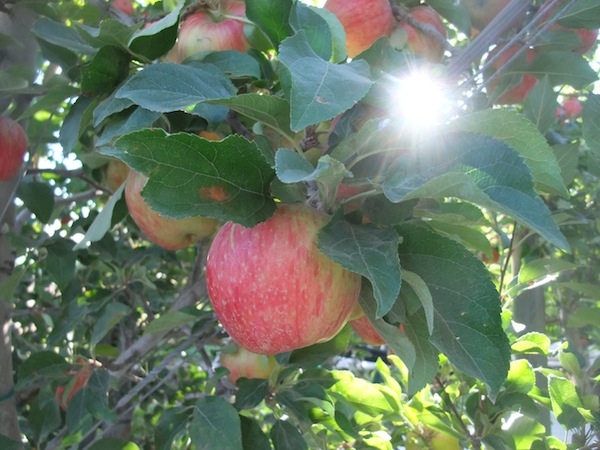
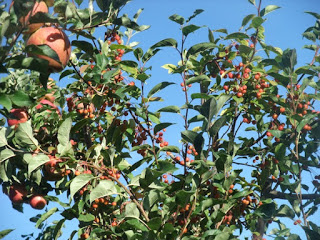
You may have noticed that some newer varieties like the Honeycrisp are more expensive than others, but I learned it's due to the tender love and care needed to grow them. They are delicate and even the stems must be trimmed so they don't puncture the fruit. There is no mechanical picking of apples, not yet anyway and picking apples takes skill. Recent immigration laws have made it tougher for guest workers to come to the US to pick fruit. Growers like Zirkle are having a harder time finding people to work in the fields during harvest.
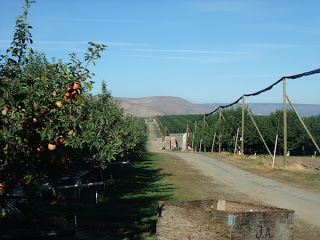
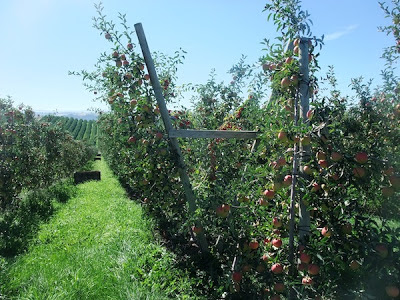
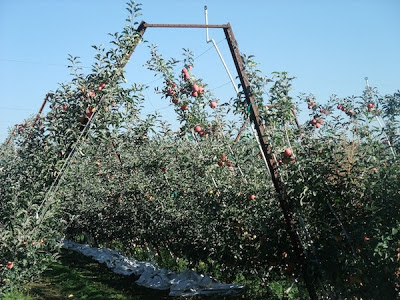
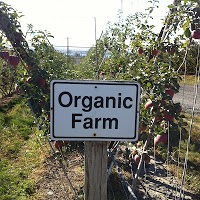
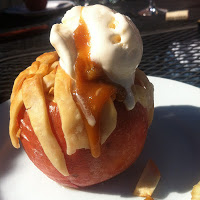
- Watermelon Summer Smoothies Recipe
Recently Safeway invited me to visit a watermelon grower, Perry & Sons. Safeway has been working with Perry & Sons for 60 years and wanted to put a draw attention to their commitment to local growers. I learned a lot about watermelon, enjoyed...
- Anthony Boutard On What Makes Fruit Great?
One of the best presentations I got to attend at the International Association of Culinary Professionals conference in Portland last month was a conversation between chef and cookbook author Deborah Madison and farmer Anthony Boutard of Ayers Creek Farm....
- All About Apples:cookbook
How would you like a free cookbook? Ok, it's an electronic book, but it's really beautifully written and has gorgeous photographs. Unlike most cookbooks, this one is based on a single tasting menu--the only one I've ever seen that focuses...
- All About Figs
When I was growing up we had a fig tree in front of our house. My sister and I were avid tree climbers but I have to say, fig trees are pretty lousy for climbing. For one thing the branches are fairly slim and won't hold the weight of even one child...
- Shf: Istbe # 2: Apples!
Mmmm, yummy, it's here again - Sugar High Fridays, the International Sweet Tooth Extravaganza! Hosted - again (Oh we're a bad bunch, not taking any of the summing-up responsibility - I will do soon, I promise!) - by it's inventor/spin...
Cooking
Washington Apples
Do apples taste better today than they used to? I was just in Washington where 65% of the fresh apples eaten in the US are grown and I learned that the varieties and growing techniques are constantly evolving. The apple trees I imagined I'd see were big bushy ones, tall and majestic growing in a fertile valley. But that's not at all what I discovered in Eastern Washington. After driving hours through sagebrush desert I got a chance to walk through the apple orchards being grown by Zirkle fruit, a fifth generation family farm operation whose fruit is distributed by Rainier Fruit.
These days, the apple trees in Washington are grown mostly on dwarf root stock, and using V shaped trellises. This makes them much easier for picking and for increasing the production per acre. The trees are short and bushy and most were positively laden with huge clusters of fruit.
Apples also must be cross fertilized and crab apples are particularly good for this, so you'll see them amongst the orchards too.
In and around Yakima you'll see a great variety of crops--hops, asparagus, mint, cherries, wheat and corn in addition to apples.
Agriculture is recent in this part of the country, dating back to the 1910's and booming in the 40's and 50's.
What also makes for great apples? Some of the same things that make for great wine. The region experiences cold nights and hot days, and has dark volcanic rock and sandy, silty, loamy soils that are low in nutrients but have good drainage and plenty of water from the Cascades. Growers learn from their experiments and their mistakes. New techniques, new varieties and even new ways to store apples mean today's apples may taste even better than the one's you remember from years ago.
Agriculture is recent in this part of the country, dating back to the 1910's and booming in the 40's and 50's.
What also makes for great apples? Some of the same things that make for great wine. The region experiences cold nights and hot days, and has dark volcanic rock and sandy, silty, loamy soils that are low in nutrients but have good drainage and plenty of water from the Cascades. Growers learn from their experiments and their mistakes. New techniques, new varieties and even new ways to store apples mean today's apples may taste even better than the one's you remember from years ago.
I spoke at length with the growers about organic apples. They told me they use less and less pesticides and the ones they do use are very targeted and dissipate quickly. Because they also grow organic fruit, they have adopted many organic techniques that they use with their conventionally grown crops as well. I was also told that there are very few insects that they can't battle naturally these days. Fruit is tested monthly to make sure their apples are not being tainted by chemicals, such as pesticide drifts. They take issue with the research done for the EWG list of "dirty dozen" fruit that says apples have higher rates of chemical residue. They pointed me to a web site funded by both conventional and organic farmers, that shares what they consider more accurate information on pesticides.
The most interesting thing I learned about apples, is that they benefit from controlled atmospheric or cold storage. Some are better after being stored than they are right off the tree! When you bring apples home, be sure to store them in the refrigerator and don't think of apples as just an autumn fruit, some like the Swiss bred Junami won't come to market until January. My favorite varieties are the spicy Braeburn, the sweet Lady Alice and the exquisite Honeycrisp, but I look forward to enjoying the juicy Jazz apple and the tangy Pink Lady as they arrive in the markets this autumn and beyond...and cooking with them too!
Disclaimer: I was a guest of Rainier Fruit on this trip to Washington. I was not paid to write this or any other post.
Disclaimer: I was a guest of Rainier Fruit on this trip to Washington. I was not paid to write this or any other post.
- Watermelon Summer Smoothies Recipe
Recently Safeway invited me to visit a watermelon grower, Perry & Sons. Safeway has been working with Perry & Sons for 60 years and wanted to put a draw attention to their commitment to local growers. I learned a lot about watermelon, enjoyed...
- Anthony Boutard On What Makes Fruit Great?
One of the best presentations I got to attend at the International Association of Culinary Professionals conference in Portland last month was a conversation between chef and cookbook author Deborah Madison and farmer Anthony Boutard of Ayers Creek Farm....
- All About Apples:cookbook
How would you like a free cookbook? Ok, it's an electronic book, but it's really beautifully written and has gorgeous photographs. Unlike most cookbooks, this one is based on a single tasting menu--the only one I've ever seen that focuses...
- All About Figs
When I was growing up we had a fig tree in front of our house. My sister and I were avid tree climbers but I have to say, fig trees are pretty lousy for climbing. For one thing the branches are fairly slim and won't hold the weight of even one child...
- Shf: Istbe # 2: Apples!
Mmmm, yummy, it's here again - Sugar High Fridays, the International Sweet Tooth Extravaganza! Hosted - again (Oh we're a bad bunch, not taking any of the summing-up responsibility - I will do soon, I promise!) - by it's inventor/spin...
